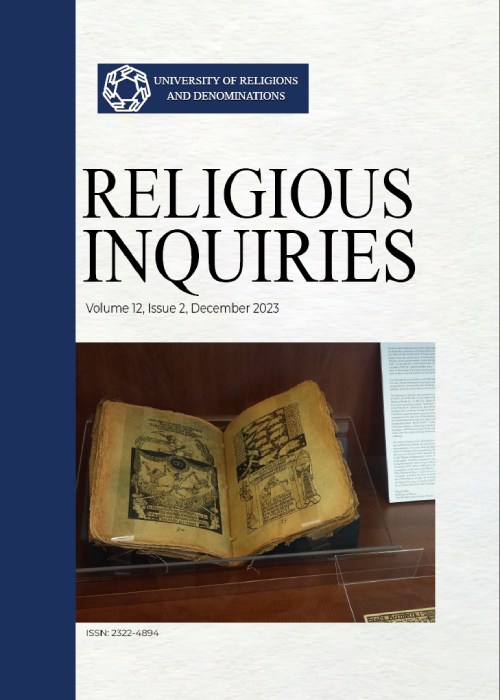فهرست مطالب

Religious Inquiries
Volume:4 Issue: 1, Winter and Spring 2015
- تاریخ انتشار: 1395/06/03
- تعداد عناوین: 6
-
-
Pages 5-16This article discusses the apparent contradiction between the corporeal nature of human beings, which points to a bodily nature for their happiness, and the belief of many monotheists that happiness consists in the incorporeal state of union with God. The article focuses on the works of two important Muslim and Christian thinkers, Ibn Tufayl and Thomas Aquinas, and explores the solutions they provide in this regard.Keywords: union with God, happiness, corporeal, Ibn Tufayl, Aquinas, resurrection
-
Pages 17-30This article studies the problem of eternal life from a philosophical perspective. It focuses on the approaches of Bergson, Husserl, and Heidegger from contemporary philosophy, and shows that using these three philosophical approaches can better explain certain aspects of revealed theology, such as resurrection of flesh, eternity in a transcendent dimension, and eternal life as the angels in heaven. In this way, a point of interaction between philosophy and theology is highlighted.Keywords: eternal life, contemporary philosophy, Bergson, Husserl, Heidegger, revealed theology
-
Pages 31-42Ayn Rand was a Russian-born American philosopher, novelist, and playwright, whose interpretation of ethical egoism is one of the most important interpretations of this theory. Rand is a proponent of intellectual egoism, and rationalism is a fundamental element in her ethical theory. This article attempts to review, analyze, and criticize her interpretation of ethical egoism. Additionally, an ethical theory known as ego-altruism will be introduced in opposition to Rands theory. Ego-altruism proposes that the pivot of ethics is to maintain balance and equilibrium between the self and others.Keywords: ego, altruism, ethical egoism, Ayn Rand, ethics
-
Pages 43-50This article studies the problem of evil in Abrahamic religions and philosophical traditions, and tries to restate their solutions in a contemporary language. The author aims at affirming traditional Abrahamic approaches to theodicy that preserve divine omnipotence, benevolence, and omniscience, but without denying the reality of evil.Keywords: Problem of evil, theodicy, Abrahamic Religions
-
Pages 51-64This article discusses the function of dialectic in religious history, focusing on the works of two major sixth century Indian intellectuals and doxographers Bhāviveka and Haribhadra Sūri, who belonged to the competing Madhyamaka Buddhist and Jaina traditions respectively. The article studies how these two figures used medical metaphors for their dialectic purposes.Keywords: doxography, dialectic, Bhāviveka, Haribhadra Sūri
-
Pages 65-75This research is an attempt to compare the views of Farabi and Ibn Sina on the question of happiness, which is discussed in two parts: the definition of happiness and its relation to the faculties of the soul. Farabi has suggested five definitions and Ibn Sina one definition for happiness. It will be shown that in some respects the definition of Ibn Sina and in some others those of Farabi are more to the point. In regard to semantics, Farabi uses a few terms such as good, joy, and true wisdom, while Ibn Sina employs such terms as joy, perfection, good, reward, and achievement as equal to happiness. In regard to the relationship between happiness and the faculties of the soul, Farabi holds that experiencing happiness is confined to the theoretical rational faculty of the soul and the other faculties cannot understand happiness, whereas Ibn Sina argues that all the faculties of the soul have the ability to acquire happiness, and the happiness of each faculty lies in the actuality of its potentials.Keywords: happiness, faculties of soul, rational soul, Farabi, Ibn Sina


